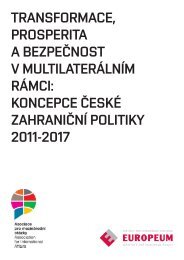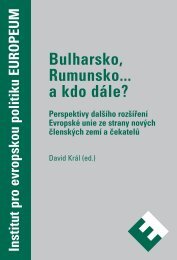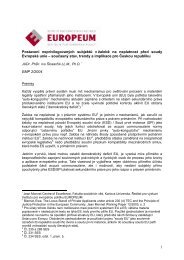eu constitutionalisation - EUROPEUM Institute for European Policy
eu constitutionalisation - EUROPEUM Institute for European Policy
eu constitutionalisation - EUROPEUM Institute for European Policy
Create successful ePaper yourself
Turn your PDF publications into a flip-book with our unique Google optimized e-Paper software.
Chapter 4: Government Coalitions and Institutional Re<strong>for</strong>m at the IGCreferendum to take place in June 2003. At the same time, Poland also hadproblems domestically within the coalition government which in March2003 led to one of the coalition partners, the Polish Peasant Party, leavingthe coalition, as well as a number of deputies from the leading DemocraticLeft Alliance leaving to <strong>for</strong>m a new party.⁷⁶ Hence, the Polish government’spolitical priorities were not focused on the Convention. The real involvementstarted only after the positive outcome of the accession referendum.Thus by the start of the IGC Polish government’s priorities clearly statedthat apart from the reference to Christianity and security issues, it wasalso concerned about the number of Commissioners and in particular thethreshold <strong>for</strong> qualified majority voting in the Council.⁷⁷The beginning of the IGC was marked with the public emergence ofa coalition between the Spanish and Polish governments with the mainpriority of defending the system of weighted votes agreed upon in Nice.The two countries held regular consultation meetings.⁷⁸ Foreign MinistersPalacio and Cimoszewicz wrote a joint article, ‘How to keep a balance inEurope’s new Treaty’, published in Financial Times, arguing <strong>for</strong> retainingthe Nice agreement.⁷⁹ Within a month President Kwasniewski and PrimeMinister Miller had visited Madrid. On the occasion of Kwasniewski’s visiton 30 September 2003, Spain and Poland issued a joint declaration on the<strong>for</strong>thcoming IGC, in which they reiterated their position on retaining theNice <strong>for</strong>mula <strong>for</strong> the QMV voting system.⁸⁰The Spanish-Polish coalition was concerned firstly that, according to the<strong>for</strong>mula proposed by the Convention, the states with a high percentageof population compared to the total EU population would improve theirinfluence on the Council decisions. At the same time, the <strong>for</strong>mula wouldreduce the influence of several members (apart from Spain and Polandalso Czech republic, Hungary, Belgium and Portugal). Secondly, and mostimportantly, the new <strong>for</strong>mula considerably reduced the Spanish-Polishcapacity to block Council decisions. This was particularly sensitive as in76) After the 2001 elections, the government consisting of the Democratic Left Alliance (with Prime MinisterMiller) in a coalition with Polish Peasant Party and the Labour Union had a strong anti-EU front in theParliament (the League of Polish Families and the Self-defence).77) Trzaskowski (2004): 61. Confidential interview with Polish official in Brussels 10 September 2004.78) Confidential interview with Polish official in Brussels 10 September 2004 and Spanish official in London1 July 2004.79) Palacio and Cimoszewicz (2003).80) Spain and Poland (2003).122Chapter 4: Government Coalitions and Institutional Re<strong>for</strong>m at the IGCNice Spain and Poland had been upgraded to a position of near parity withthe large states in this regard and Prime Minister Aznar had claimed thisresult as a personal negotiation victory.As the IGC started under the Italian Presidency it became apparent thatthe voting system in the Council would become one of the most disputedissues in the negotiations as Spain and Poland on one hand, and France andGermany on the other, appeared determined to fight to realise their position.On the eve of the Brussels <strong>European</strong> Council Summit in December,it was clear that both sides would be taking a tough line on the issue ofQMV system. Poland became as a fierce defender of the Nice <strong>for</strong>mula asSpain during the IGC. Given that both countries also had a good relationshipwith the UK, there was a joint ef<strong>for</strong>t <strong>for</strong> raising the UK’s support (orat least ensuring that the UK would not support France and Germany) onthe QMV voting system in exchange <strong>for</strong> their support on the British ‘redlines’ concerning the extension of the QMV to areas of taxation and CFSP.Having the request <strong>for</strong> pro-active support also from France and Germany,Britain found itself in a pivotal role between both coalitions trading supportin exchange <strong>for</strong> the concessions on its preferred issues.The Brussels Summit ended with the break-down of negotiations. TheIGC resumed under the Irish Presidency and the Spanish-Polish coalitionremained largely intact until the change of government in Spain followingthe elections on 14 March 2004. However, with the new socialist PrimeMinister José Luis Rodríguez Zapatero, the Spanish strategy in the IGCshifted towards a more conciliatory tone. Whereas the People’s Party wasemphatic about protecting national interests and sought alliances withcountries left out from the Franco-German tandem, the Socialists werekeen to be part of Franco-German axis and willing to accept its leadership.⁸¹Zapatero stated that he would try to overcome the isolation of Spain createdby the <strong>for</strong>mer Prime Minister Aznar, and he decided to re<strong>for</strong>mulate thenegotiation problem from ‘whether double majority <strong>for</strong>mula can work’ to‘what double majority <strong>for</strong>mula can work <strong>for</strong> Spain’.⁸² This effectively meantthat Zapatero had declared his intention to accept the Convention proposalon the QMV system which consequently led to the Polish governmentexpressing its willingness to adopt a different approach in negotiations to81) Magone (2004).82) Ibid.123








